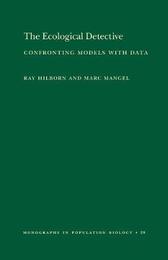
|
The Ecological Detective: Confronting Models with Data (MPB-28)
Paperback / softback
Main Details
Description
The modern ecologist usually works in both the field and the laboratory, uses computers and statistics, and often works with model-based concepts. This book investigates ecological data much as a detective would investigate a crime scene by trying different hypotheses until a coherent picture emerges. The book makes liberal use of computer programming for the generation of hypotheses, exploration of data and the comparison of different models. The authors' attitude is one of exploration, both statistical and graphical. The background required is minimal, so that students with an undergraduate background in statistics and ecology should be able to make use if this work.
Author Biography
Ray Hilborn is Professor in the School of Fisheries, University of Washington and the coauthor, with Carl Walters, of Quantitative Fisheries Stock Assessment. Marc Mangel is Professor of Environmental Studies and a Fellow at College Eight at the University of California, Santa Cruz, and a Visiting Professor at the University of Glasgow. He is the author of Decision and Control in Uncertain Resource Systems and coauthor, with Colin Clark, of Dynamic Modeling in Behavioral Ecology.
|